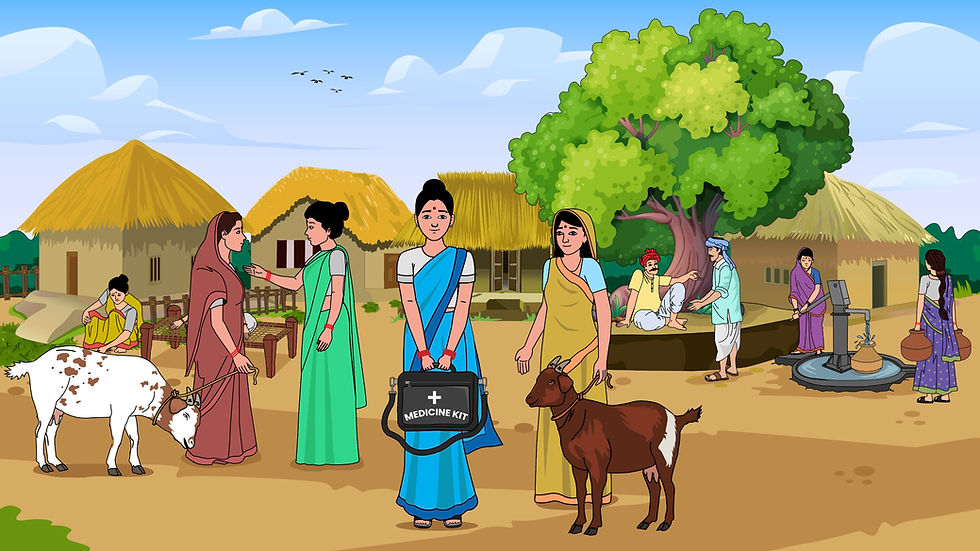Pashu Sakhi Model in India: Empowering Rural Women in Small Livestock Value Chain.
- Global Services TGT
- Feb 12, 2025
- 3 min read
The Pashu Sakhi Model is an innovative community-based approach in India that empowers rural women by training them as livestock extension workers. This model plays a crucial role in enhancing livestock health, improving rural livelihoods, and promoting women’s leadership in the small livestock value chain.
Livestock farming is a vital source of income for rural households in India, particularly for small and marginal farmers. However, access to veterinary services remains limited in remote areas. The traditional dependence on government veterinary services often results in delayed treatments and increased livestock mortality. The Pashu Sakhi Model addresses this gap by training local women to provide primary livestock healthcare services and support the small livestock value chain.
The Pashu Sakhi model has been successfully implemented through government programs, NGOs, and rural development projects, including:
National Rural Livelihoods Mission (NRLM): One of the key promoters of the model, integrating it into various state-level livelihood programs.
State Rural Livelihoods Mission (SRLMs): Implementing the model at the grassroots level with community participation.
NGOs and Development Agencies: Organizations like The Goat Trust and other grassroots institutions provide training, technical support,t and financial aid to Pashu Sakhies.
Roles & Responsibilities of a Pashu Sakhi:
A Pashu Sakhi is a trained rural woman who provides livestock-related services, including:
Basic Animal Healthcare: Treating minor diseases, providing first aid, and referring serious cases to veterinarians.
Vaccination & De-Worming: Assisting in preventive healthcare measures to reduce disease outbreaks.
Livestock Nutrition and Management: Advising farmers on balanced feed, fodder, and improved livestock rearing practices.
Artificial Insemination (AI) & Breeding Support: In some cases, trained Pashu Sakhies also facilitate AI services.
Market Linkages: Helping farmers connect with markets for better price realization of livestock and value-added products.
Record Keeping & Awareness Building: Documenting livestock health data and educating communities on sustainable livestock practices.
Value Chain Strengthening: Supporting small-scale farmers in accessing inputs, improving livestock-based product quality, and integrating with market networks.
Impact of the Pashu Sakhi Model:
The model has significantly contributed to rural development and women’s empowerment in multiple ways:
Enhanced Livestock Productivity: Timely healthcare interventions reduce mortality rates and improve livestock productivity.
Economic Upliftment of Rural Women: Pashu Sakhies earn income through service fees and consultations, making them financially independent.
Improved Access to Veterinary Services: Remote villages now have local livestock healthcare providers, reducing dependency on distant veterinarians.
Social Recognition and Empowerment: Women trained as Pashu Sakhies gain community respect and decision-making power within their households.
Strengthening the Small Livestock Value Chain: Improved production practices, better input access, and structured market linkages contribute to higher incomes and rural economic resilience.
Challenges and Way Forward:
Despite its success, the Pashu Sakhi Model faces challenges such as:
Limited Technical Expertise: The need for continuous training, skill upgradation and handholding.
Financial Sustainability: Ensuring sustainable income models for Pashu Sakhies.
Integration with Veterinary Infrastructure: Strengthening linkages with government veterinary services for better support.
Market Access and Value Chain Gaps: Addressing barriers that prevent small-scale livestock farmers from maximizing their economic potential.
To overcome these challenges, policy support, public-private partnerships, and digital training tools can be introduced to enhance the effectiveness of the Pashu Sakhi Model.
The Pashu Sakhi Model is a transformative approach that bridges the gap in veterinary services while empowering rural women. Scaling up this model with proper training, financial inclusion, and institutional support can lead to a more resilient and self-sustained small livestock value chain in India.




Comments